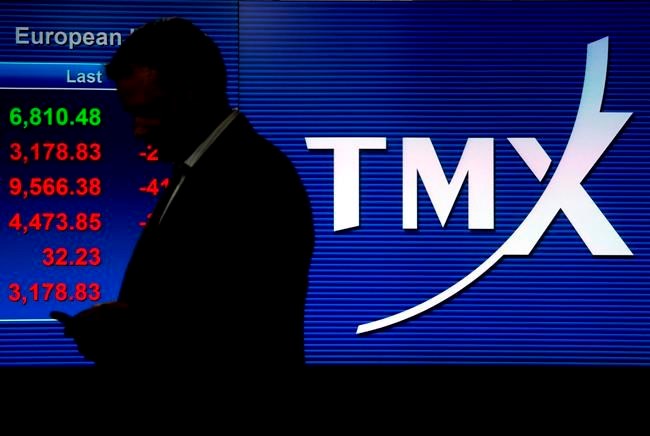TORONTO — The novel coronavirus has whipsawed stock markets but investors shouldn't take Monday's sharp rebound as a signal that volatility has ended, say investment experts.
"It's too soon to say that everything has been straightened out and the all clear has been blown," says Greg Taylor, chief investment officer of Purpose Investments.
He said investors should take a measured approach because the bounce after the worst week since global financial crisis may not last.
U.S. stock markets gained as much as 5.1 per cent Monday while the TSX was up 1.8 per cent after losing 12.9 and eight per cent, respectively, from record highs.
The fear of the unknown surrounding the virus that's spread from China to scores of countries is what caused last week's deep selloff. Markets can move higher with evidence that the virus is contained but all bets are off with a pandemic that severely hits companies.
"We are dealing with so many unknowns it's impossible to call the bottom right now," Taylor said in an interview.
Part of the volatility was the result of big investors like pension funds rebalancing portfolios at the end of the month and then reallocating money to start March.
"It was really a period where it seemed like a lot of people were just selling whatever they could to try and get some cash into the doors and that looks to me like classic capitulation selling," he said.
What's troubling for stock market watchers is that the bond market isn't confirming a bounceback. The U.S. 10-year treasury yields are still falling and sitting around 1.1 per cent, which is an extreme downward move from where they started the year.
The market dip could be an opportunity to buy quality stocks at a discount but investors shouldn't be in a rush.
"There's still going to be more volatility throughout the next few months and you will get different opportunities but if you have a lot of cash this is not a bad time to start looking at opportunities."
Investors should have a long-term plan that reflects their financial goals so they don't give in to fears when times get tough or take unnecessary risks, said Jeff Hull, senior financial adviser at Manulife Securities Inc.
He cautions against chasing the get-rich-quick schemes by investing in companies that could benefit from coronavirus, such as makers of face masks like 3M.
Masks are a very small part of 3M's business and won't have a meaningful impact on earnings.
And the benefits could quickly dissipate once the virus inevitably starts to burn out.
"The most important thing is people need to be patient, pick their moments right and most importantly they need to look for great companies at attractive discounts, companies that they want to hold for the longer term," he said.
Hull said investors shouldn't rush to buy and "bet the farm" on companies just because their stock price is a little cheaper.
Michael Greenberg, portfolio manager at Franklin Templeton-Multi Asset Solutions, said he began chipping away by buying a little on Friday but thinks volatility will continue for the next month or so.
Diversification is key. And that means also considering Chinese firms, which have been the best performers on Asian markets in the past couple of weeks.
While stocks have sold off, government bonds and many liquid alternative strategies have done just the opposite. "This should be a powerful reminder of the benefits in having a well-diversified portfolio," said Mark Stacey, head of portfolio management at AGF Investments Inc.
"By allocating to a range of low and/or negatively correlated asset classes, investors are better able to limit losses from a market correction, and should also be rewarded with reduced portfolio volatility, leaving them positioned to recover any of the losses they do incur more quickly."
Markets are likely to bounce around and weaken as more cases confirm the spread of the virus and its economic implications, said Craig Fehr, an investment strategist at Edward Jones.
"Last week is exactly what panic looks like in the equity markets," he said.
Fehr said it's a good time to review your goals and make some adjustments, rebalance portfolios and eventually add investments in the dip.
But that doesn't mean changing your investment strategy because of a 10, 12 or 15 per cent pullback in equity markets.
"They happen frequently, they just don't happen as violently as we saw last week but I don't think it alters the very long-term outlook for the economy or the markets. I think this is more of a temporary setback."
In fact, it doesn't even mean investors should expect to lose money this year, said Allan Small, senior investment adviser at HollisWealth.
"I don't think the year is a write off because we've seen one week of a correction," he said.
"Everyone who's treating this like the end of the world I think they're going to be mistaken and I think the markets will rebound, it's just a matter of when, not if."
This report by The Canadian Press was first published March. 3, 2020.
Ross Marowits, The Canadian Press

